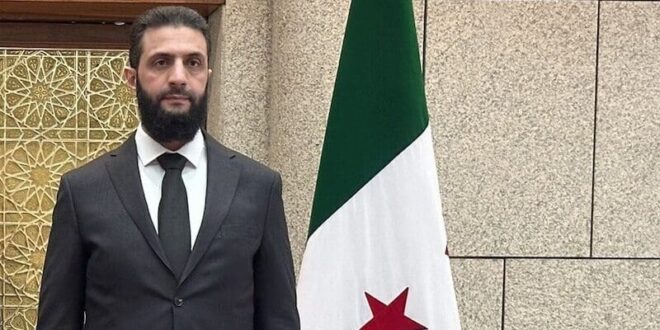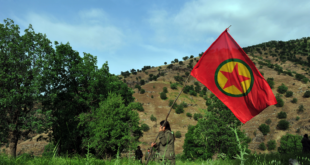As early as 2011, during the initial days of the Arab Spring, I anticipated the rise of Islamist imperialism within the global rise of right-wing exclusionary movements. The events continued to follow that same catastrophic trajectory as the extreme right from Indonesia and the Indian Subcontinent to the Middle East and the Caucuses to Europe and the United States kept rising. In 2019, I wrote again about Islamism and the neo-Ottoman project.
By the fall of 2023, it became clear that the Middle East had reached the abyss. With the Islamist takeover of Damascus in late 2024, we can see the abyss looking back at us. As for what is left of the left near and around the dying center, the anti-Marxist apologia and culturalist morality have turned them into little more than pantomimes adamantly committed to universal discrimination. Just as the advocates of liberation theology desperately need to be liberated from theology, the Arab Springers need an Indian summer with the Naxalite, and the Occupiers need to historically materialize a way out of the private parks of idealism.
The so-called transitional government in Syria is a show directed by the Islamists as a diversion until they consolidate their grip on power. It is a devastating mistake to assume that the Islamist movement in Syria might somehow be different than other Islamist movements and that it would potentially respect human dignity, rights, and freedoms at any individual or collective level. In 2011, a civilian movement for democracy started, but it was quickly highjacked by the Muslim Brotherhood and Al-Qaeda affiliated groups in a way not dissimilar to the Islamist highjacking of the 1979 Iranian revolution.
Ironically, for twelve years, from 2012 to 2024, Syria became a hot conflict zone between Shia Islamism, managed by Tehran and represented by its proxies, and Sunni Islamism, overseen by Ankara and performed by its proxies. Assad’s regime was secular, but its brutal deployment of force against civilians made its fall only a matter of time. The Russian Federation tried to save the regime, but instead of going all the way against the Turkish-backed Islamists, in 2018 and afterward, Putin made a series of deals with Erdogan leaving parts of Northern Syria under the rule of the Sunni Islamists. Assad’s forces might have been able to take over Idlib, but Putin did not give them permission to make any further advances. In the meantime, Assad increasingly relied on Hezbollah and other Iranian-backed Shia Islamist militia to maintain his already deeply compromised rule. Those who saved his regime for over a decade also compromised the Syrian sovereignty continually sidelining the government in Damascus. Most notably, Hezbollah and the Iranian regime used Syrian territory to transfer and accumulate rockets threatening Israel while Putin made personal deals with Erdogan at the expense of the Syrian state.
At the end of November 2024, after Hezbollah forces in both Syria and Lebanon had just suffered the heaviest and deadliest attacks by the Israeli air forces thus far, the Sunni Islamists backed by Turkey seized the moment and started their attack in three directions, south, east, and west. Erdogan knew that that was the moment to safely trash his former agreements with Putin. The Kremlin was too consumed by the war in Ukraine to risk a confrontation for Assad’s sake. Meanwhile, the Iranian regime had already been overwhelmed by crises and fears, especially following the rapid destruction of the Hezbollah forces and the rumors that the Khamenei regime was next on Israel’s list. Knowing that Trump’s return to the White House would only make the Israeli plan to go after the ruling regime in Tehran more daring, Khamenei was not in any position to gamble on Assad’s behalf. Also given the fact that Iranians have been desperately waiting for any opportunity to finally bring down the Islamic Republic, the mullahs in Tehran were not going to do for the secular Bashar al-Assad what they did not dare to do for their beloved Hasan Nasrallah. From their perspective, engaging in external conflicts is supposed to prolong the survival of the regime in Tehran not put it at further risk. Thus, Tehran and Moscow finally left Assad’s regime for its fate.
Erdogan was the one who laughed all along and laughs now as jihadis loyal to him are in full control of Damascus for the first time. He has been manipulating the Kremlin, the White House, and the EU leaders while steadily advancing his imperialist project as the new sultan and caliph. The longer the West and the Russian Federation are entangled in strategic conflicts, the better for Erdogan who never fails to miss any opportunity to use both sides. What is coming will not be any less bloody for Syrians and others in the region. ISIL was a mere experimental and tactical project for Sunni Islamism. Seeing himself as the tactful, patient, and pragmatic sultan and would-be caliph, Erdogan has secured the support of both NATO and the Kremlin for his caliphate enterprise.
Despite the legitimate wishes of Syrians from all backgrounds for a peaceful and inclusive Syria, what is about to unfold these days, the last weeks of 2024, is not a transition to a democratic state; it is a transition to an Islamic state. This is Al-Qaeda for the first time assuming the role of the government and a re-former of a state following the fall of its capital city. Just like some of the Taliban leaders, some within the Al-Qaeda movement have learned how to put up a less violent fasad. If anything, this version of Islamism is far more dangerous than the openly terroristic one because it lures people in much larger numbers into its fatal trap. Unlike Mulla Omar and Bin Laden, the Islamists within this wave have been trained in PR for pragmatic purposes. The Taliban leaders were trained in Qatar while the new Al-Qaeda leaders received their PR training in Turkey. Also, unlike Zarqawi and Baghdadi, these Islamists have been taught not to broadcast their crimes of beheading, stoning, and burning people alive. They are trained not to shout slogans of total destruction, collective enslavement, or anything too indicative of their global enterprise of jihad. They have been taught that to become professional politicians they should never reveal what they intend to do. Following the Muslim Brotherhood school and the Erdogan doctrine in particular, they only express what they never intend to do.
The ISIL experiment proved that while broadcasting brute terrorism may attract more fanatics in the West, Africa, and Asia, in the long run, it diminishes an Islamic state’s chances of survival in the international arena. Today most Islamists know that the ISIL version of a caliphate is doomed to fail. Therefore, the dominant model of Islamism avoids commercializing and broadcasting gruesome terror. For most Sunni Islamists, the role model is Erdogan. Like the Turkish sultan, they make an effort to sound calm, principled, and almost tolerant precisely in order to deceive liberals into believing that this version of Islamism is different. They capitalize on the false belief that there is such a thing as moderate Islamism. This is not an entirely new Islamist strategy. In fact, it is more of a return to the original strategies and techniques of the Muslim Brotherhood. Both are ultra-right with similar strategies and goals, but they differ in terms of their preferred tactics.
Bin Laden and Zawahiri diverged from the Muslim Brotherhood when they adopted the method of commercialized terrorism. In the years following the fall of the Baath regime in Iraq, Zarqawi, the leader of Al-Qaeda in Iraq, and Baghdadi, the leader of ISIL, took commercialized terror to a more extreme level. ISIL ran its course, and when it became clear to the Turkish secret intelligence that ISIL was not salvageable, the ISIL members were simply given new uniforms to join or found other Islamist groups. Those groups rule Damascus now. The Muslim Brotherhood, to which Erdogan belongs ideologically as an Islamist, has always been pragmatic. Their leaders know when and how to exploit liberalism. They use whatever means possible to have a grip on power. Once they are in power, things will only get worse for everyone and every group including Muslims, Arabs, and Turks, but it will certainly get even worse for non-Muslims, Kurds, Yezidis, Armenians, Assyrians, and other minoritized groups.
In terms of Sunnis and Shias, wherever Islamism rules, one group is brutalized by the other. The Assad regime was secular, but because of its alliance with Shia Islamism, Sunni Islamists saw its fall as a historic victory over the Shias. Indeed, they have been emphasizing the symbolic significance of conducting prayer rituals in the Umayyad Mosque in Damascus, something Erdogan personally expressed wishes for when Assad was still the ruler of Damascus.
The fall of Damascus into the hands of the Sunni Islamists will have many international ramifications as well. I do not think this will decrease the threat to Israel in any way, which means the wars and destruction will only intensify. The Shia Islamists and Assad talked tough, but they always knew that their main enemy was the Sunni Islamists, so they would have been happy keeping the conflict with Israel manageable for both sides, the Israelis as well as themselves. That is how the ruling Iranian regime operates too. It will never deliberately put its fate at serious risk for the sake of Palestinians, Lebanese, Syrians, Yemenis, or Iranians for that matter. Shia Islamism’s anti-Zionist discourse is mostly for Islamic consumption. Shia Islamism always favors full propaganda wars, but on the ground, it usually restrains from doing any foolish thing that might drag the whole Shia camp into a war with Israel or the United States.
However, in 2024, Hezbollah miscalculated Israel’s potential reaction. Israel too went a step too far weakening Hezbollah in Syria so severely that the balance of forces on the ground abruptly changed in the interest of the Sunni Islamists backed by Turkey. Erdogan seized the opportunity to unleash the Sunni Islamist forces to invade Aleppo. The rest happened faster than what Syrian, Israeli, Turkish, Iranian, and Russian officials expected. When Assad’s own army did not put up a fight in Aleppo, it became clear that the Iranian, Lebanese, and Iraqi Shia militias were not prepared to fight for Assad.
Unlike Shia Islamists, Sunni Islamists do not feel psychologically pressured to prove their fidelity to the Islamic project of jihad. Shia Islamists’ take the Sunni majority’s suspicions and distrust of Shias for granted. As a result, Shia Islamists exaggerate in their propaganda, often becoming victims of their own media war. Sunni Islamists, on the other hand, plot, act, and then speak, so they make more professional terrorists.
Sunni Islamism has always aimed to revive the Islamic caliphate. Inspired by his hero, Selim I, Erdogan aims to be the sultan who is also the Caliph, and he has been perceived as such by most Sunni Islamists. Therefore, to them, while Aleppo and Damascus are important gains in themselves, they are, more importantly, two steps closer to Jerusalem, following Selim I’s exact map of conquests. From their perspective, after Damascus comes Jerusalem, then Egypt, and finally Mecca and Madina. By taking over Mecca and Madina, the neo-Ottoman sultan would become the Caliph. Be it as it may, what is coming most likely will be much worse.
Bashar al-Assad’s reliance on Hezbollah and Iranian Shia militias for all those years of the civil war was a mistake pragmatically and otherwise. Something his father, Hafez al-Assad, would have avoided. He made an even more fatal mistake after the 2003 American invasion of Iraq when he made Syria a corridor for the passage of Sunni Islamists to Iraq. Some of those same Islamists brought back jihad to Syria. That is exactly how the likes of al-Jolani emerged in such large numbers following the 2011 uprisings. Also, Bashar al-Assad trusted and supported the Iraqi Baathists, another strategic mistake Hafez al-Assad would never have committed. Many former Iraqi officers and secret police agents started recruiting Sunni jihadis in Syria, especially after 2008. Bashar al-Assad is not the only state leader who made the fatal mistake of playing with Islamists. All those who tried to use Islamists ended up being used by Islamists. Islamism emerged first and foremost as an anti-communist movement.
The most universal feature of fascism across places and times is an anti-communist fever. Despite drastic ideological differences and political conflicts among them, all fascist forces are eager to go after the last communists in the world. While it shares myths of origin and sources of inspiration with many premodern forces and movements, Islamism is a modern movement. It was born in the 20th century. The history of Islamism is remarkably similar to the history of European fascism. Like European fascism, Islamism was born primarily as an anti-communist and an anti-democratic movement when Marxian communism was on its way to becoming an international grassroots movement of universal emancipation. Communism was the first universal movement to threaten various regimes of social inequalities and political oppressions on such a vast scope and so overwhelmingly. The conservative forces and institutions of power from the United States and Western and Central Europe to North Africa and various parts of Asia were bound to react violently. The reaction took countless forms. As I show in an upcoming book titled Fascism or Whatever You Want to Call It, if there is one such form of reactionary ideology and power that can be detected universally, it is fascism.
In the 1920s, the British colonial administration and the top Islamic institution in Egypt and Sudan worked together to agitate anti-communist sentiments among ordinary observants of Islam on the basis that communism is atheism (Mousseline and Franco appealed to Catholics on similar bases). Of course, Aryan fascism added the antisemitic element to European fascism. Islamism wholeheartedly embodied the double formula of anti-communist and anti-Jewish impulsion. Like the Nazis, Islamists often portrayed Marxism as a Jewish invention and conspiracy.
The Shah used the Islamists against the communists, but before he knew it, the Islamists also sacked him. Naser and Sadat did the same thing, unleashing Islamists to eliminate the Egyptian communists. Sure enough, the Egyptian Muslim Brotherhood carried out a bloody campaign against the communists and many liberals. Then they assassinated Sadat. The Reagan administration used the mujahedeen against the socialist government in Kabul and the USSR. After taking over Afghanistan, the Mujahedeen gave the United States September 11. Islamists break every deal at a moment that best suits their goal. They make truces and agreements only to break them when doing so is beneficial for themselves and devastating for their partners.
As fundamentalists, Islamists borrow their pragmatism and opportunism from the history of religious conflicts and conquests. They take the Islamic scripture as a literal source for social and political guidance while taking inspiration from what the early Muslims (actually or supposedly) did. It is ridiculous to generalize the charge of militarism and fanaticism on the hundreds of millions of Muslim believers in today’s world. It is equally absurd to romanticize the institution of religion or perceive religious war as a form of resistance.
The Islamists in Syria might go through the motions of staging some sort of elections, but al-Jolani, who is a recent graduate of the Turkish school of Islamism and an alumnus of Al-Qaeda in Iraq, will call the shots and soon will become the little caliph of Damascus. In the broader picture, he will function like the neo-Ottoman Wali of Syria. As soon as another opportunity presents itself, the Islamists will seize it to try to finish what Hamas has tried and failed to accomplish. Like Hamas and other Islamist forces, they exploit the hopelessness of many Palestinians and others to gain popular sympathy, but, also like every other Islamist force, the last thing they care about is people’s lives. To Islamists, people, especially perceived Muslims, are nothing but cheap tools of war.
Islamism is, by far, the most dangerous movement in the world. If they had the means to kill millions of people indiscriminately, they would kill millions of people indiscriminately. The French colonial army notoriously violated the human rights of Algerians on a massive scale. The Algerian Islamists in the 1990s went much further than that. To them, Algerians were mere war material. That is the same mentality among all Islamists. To Hamas, for example, the Gazans are not even hostages. From Hamas’s perspective, the Gazans are more like walls, sandbags, or whatever objects that exist in abundance to be used as tools in the holy war, so their talk about resistance and anti-colonial struggle is purely for fooling foreigners, especially the falsely called left in the West. As I show in a book titled Fascism in the Middle East, from the perspective of leftism in the Middle East, Islamism is fascism, period.
Islamism is an international problem, but it is first and foremost a problem for perceived Muslim societies. Islamism has indeed been confronted in all those societies, but there have always been powerful states and groups from the Middle East and beyond that devoted huge resources and immense capital to support Islamism making the anti-Islamist struggle in the region extremely difficult.
Following the fall of the Iraqi Baath regime, Iraqis at large, who had already been brutalized, became victims of the conflict between Shia Islamism the imperial capital of which is Tehran, and Sunni Islamism, the imperial capital of which is Ankara. Syrians at large have also become victims of the conflict between these two imperial forces. Today, Iraq is a failed state that is run from Tehran. Post-Baath Syria is on its way to becoming a failed state to be run from Ankara. Iraq has become a hub for producing Shia jihadis at the service of their masters in Tehran. From now on, Syria will become an even larger center for producing Sunni Islamists and neo-Ottoman janissaries. Thus far, the so-called international community is content to play along letting the first Al-Qaeda-led state press its teeth deep into the Syrian society crushing what is left of their political aspirations for ages to come.
With Islamism, any talk of accommodation and hope for a peaceful political arrangement is mere self-deception. Engaging with the Islamists is suicidal for all. They want to give the impression that they have become moderate, tolerant, and so on. It is absurd for the rest of the world to fall for the same Islamist trick over and over again. The moment the Islamists secure the institutions and borders, a season in hell will start for everyone, including those who are euphorically dancing on the streets of Damascus today.
It is doubtful that non-Islamist leaders are so naïve as to believe Erdogan and the new Islamist rulers of Damascus. They only pretend to be so naïve as if the deliberate ignorance provides a moral passage. Many Syrians already realize that the coming state in Syria will not be any less brutal than the Baath state, but as usual, elites who dominate the social institutions of power act in the name of an entire population while elites from other countries act as if that is the case because the premises of the plane of performance are assumed globally.
 Eurasia Press & News
Eurasia Press & News




